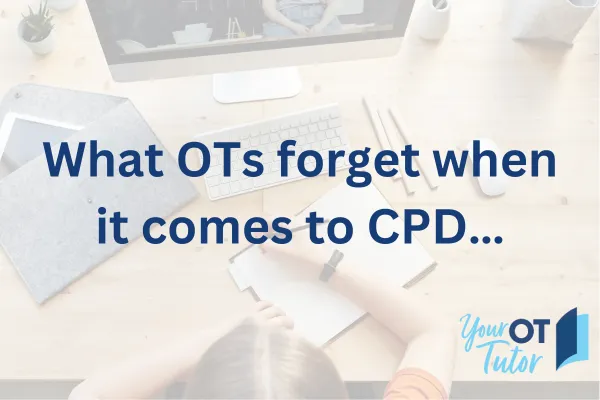THE YOUR OT TUTOR BLOG
Some short articles on important topics for occupational therapists...
Hi, Clare here...I often see recurring questions or topics come up in OT discussion boards or networking events, so I have created some short articles on some of these topics.
Got a question or topic in mind?
If you have a particular topic or question that you'd like me to cover in a blog post, please send me your suggestion via the Your OT Tutor enquiry form and I'll add it to my list!


What OTs forget when it comes to CPD…
It’s nearly the 30th of November, which means you need to make sure you’ve got your 20 hours of CPD done for your AHPRA registration renewal! But before you go rushing to sign-up for the first course or webinar you come across that you’re vaguely interested in, here’s my thoughts on what OTs forget when it comes to CPD…
1. You should reflect on your current competencies, interests, and future career goals when planning what CPD to complete.
The key word in here is reflect! While some valuable CPD can happen in an ad hoc, spur-of-the-moment manner, ideally it is most effective for your learning when it is based on what you currently know and don’t know, and what skills you want to improve, and you can only do this through reflecting.
I good way to consider what you know and don’t know is to reflect on your competencies. Your workplace will hopefully have a list of skills that you will develop in your caseload (if not, I’ll talk more about this in a future article!), so use this as a starting point to identify gaps in your skills and knowledge that you will need to learn to feel confident doing your job. The CPD you do should also be on a topic that you are interested in (not just ticking off mandatory training modules), and that has relevance for future career goals you might set for yourself. For example, if one day you’d like to be a team leader, you may use CPD around supporting OT students as the starting point for that long-term career goal.
2. Think about how you like to learn so you can fully engage in the process.
There are lots of CPD formats you could choose from, which is great, because OTs like to learn differently! But if you don’t think about how you learn best, you may choose CPD that is the right topic, but not the right format, and as a result you don’t get the most out of it. Some common options include: face-to-face workshops – great if you are someone who learns best with a hands-on component; interactive live webinars – good choice if you like to listen in and ask questions, but only feel brave enough to do this with the anonymity that can come with Zoom; or self-paced online modules that you can complete in short bursts or binge sessions by fitting it into gaps in your schedule – just remember these are great if you like to work through content slowly, making notes and maybe exploring tangents as you go, but not great if you’re a procrastinator that needs deadlines to ensure you prioritise CPD, or if you learn best through discussion with others. Where possible, choose CPD options that align with how you prefer to learn, but just remember that to meet the AHPRA CPD requirements, at least 5 hours needs to be in an interactive setting.
3. Your CPD should be planned – most of the time!
Ideally most workplaces should be incorporating formal professional development planning sessions into your supervision every 6 to 12 months, so that those reflections you’ve hopefully completed in the last two points can be turned into a plan for what CPD you should be looking for and booking in. It is also part of the AHPRA CPD requirements to have learning goals, and your CPD choices should align with these goals. This type of planning will ensure you learn skills that will improve your competency, form a basis to achieving your career goals, and also allow you to add value to the services delivered by your employer (who may be paying for your CPD in the first place!).
Here's an example. You just start working in an acute stroke unit. You reflect on your current skills and gaps and identify that you are confident when it comes to assessing cognition, after just completing a rotation in a trauma caseload involving clients with TBI, but you’re a bit rusty when it comes to assessing upper limb impairments and making recommendations. You also know that you like interactive, hands-on learning where possible. You have a PD planning session with your supervisor who agrees this will be a valuable skill to learn to help you feel confident in your caseload, but to also ensure the CPD you choose aligns with what your employer needs you to be able to do. As part of the planning session, you consider what workshops or courses are available on this topic and add it to your plan, ideally with a timeframe attached.
Now it won’t always go smoothly like this, so don’t discount the value of ad hoc CPD sessions. You may actually come across a webinar on a topic that is of interest, that is relevant to your caseload, but is something that you hadn’t considered at the time when making your CPD plan. Doesn’t mean you shouldn’t do it, but just make sure you consider the previous points first before hastily signing up, so that you will actually use what you have learnt (keep reading to find out how to do this!).
4. After you’ve done the CPD, you need a plan to actually use what you’ve learnt!
I’m sure we’ve all been there – you go to a course or watch a webinar and think “that was great, we should use those assessments/treatments they discussed with our clients!” Problem is, the next day you go back to work, you get busy doing things the way you’ve always done it but maybe with a few tweaks or improvements based on what you learnt, but the big, exciting plans you may have been thinking about during the CPD never happen.
One strategy is to reflect on what you have learnt (you should be doing this any way as evidence for your AHPRA registration), and create some achievable action or outcome-based goals with timeframes attached that you can work through. To make sure you get through this list, block out some time in your schedule, or have an accountability buddy (or supervisor) that you report your progress to. Here’s an example: say you go to a journal club on pressure care and hear about some other risk assessment tools that you hadn’t come across before but that sounded useful. Your ‘to-do’ list could have finding and downloading one of the tools, allocating some time to read through the instructions or manual, or watching some YouTube videos about how to administer it, then putting together a set of guidelines for which tools could be used and in which circumstances one may be preferred; you then add this to your orientation folder or shared drive so it’s easy to find and share in the future.
5. Think about how you can share what you have learnt.
My previous point leads nicely into the last thing that’s often forgotten about CPD – sharing! While CPD should be planned and completed with your own personal learning needs in mind, in many instances you can share what you have learnt with others. It could be that you summarise your take home messages in an email or short presentation for the rest of your team, or put together some guidelines or protocols that can be added to staff orientation procedures or resources. You can even share beyond your team through the power of social media. You could share the details of helpful courses in Facebook networking groups, or tell your followers your take-home messages on your LinkedIn page about a recent CPD session you completed (this is a favourite of mine!). By doing this you are helping to spark an interest in learning within the OT profession and making it easier for us all to ensure we are delivering high-quality evidence-based practice for our clients.
If you’re already doing those five things – perfect, keep it up! If not, it’s never too late to start, and the beginning of a new AHPRA registration cycle could be perfect timing.
But do you think I’ve missed something? If you’ve got your own ideas for how OTs could be improving how they engage with CPD please let me know!
#OccupationalTherapy #CPD #ClinicalEducation






